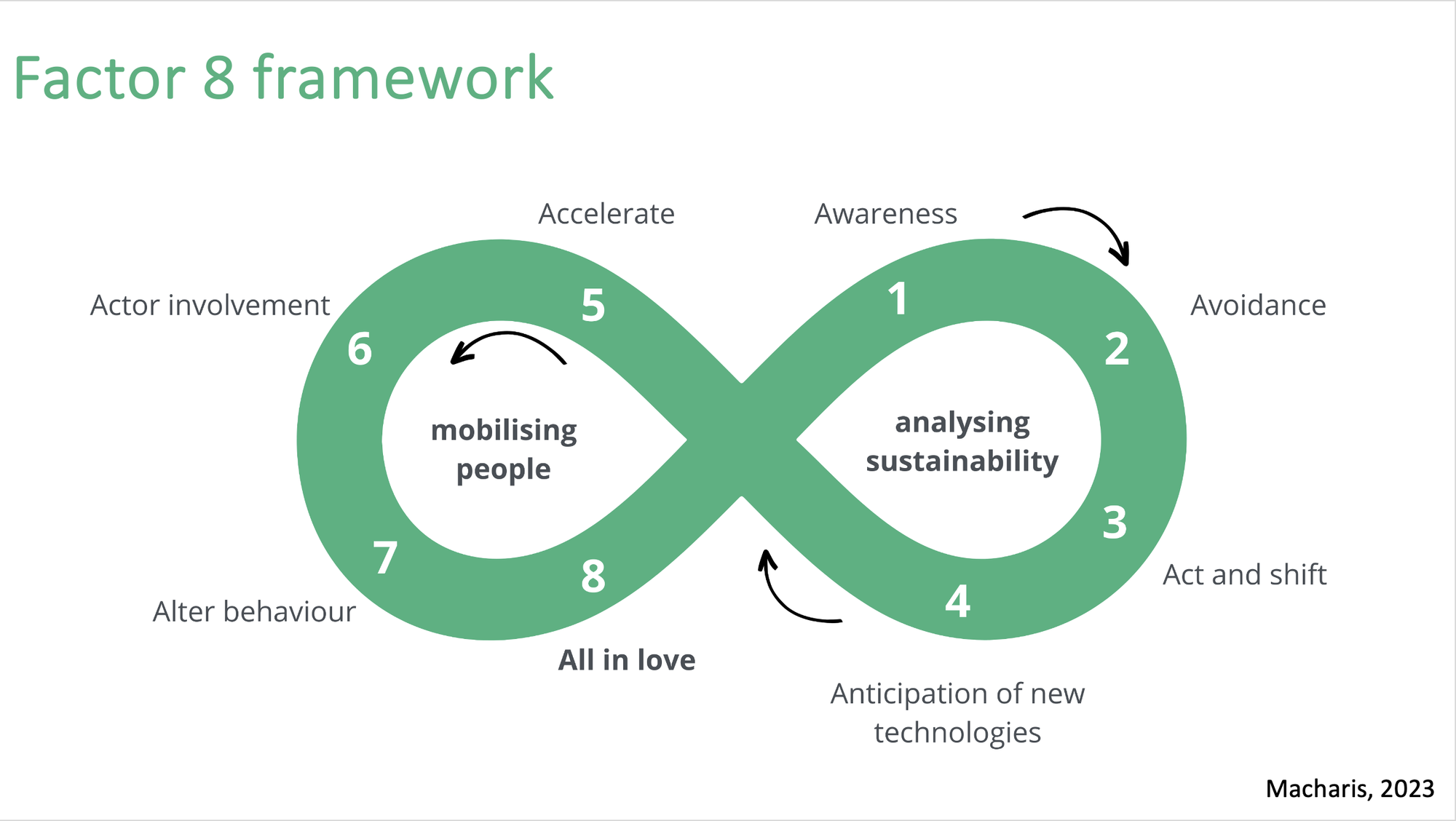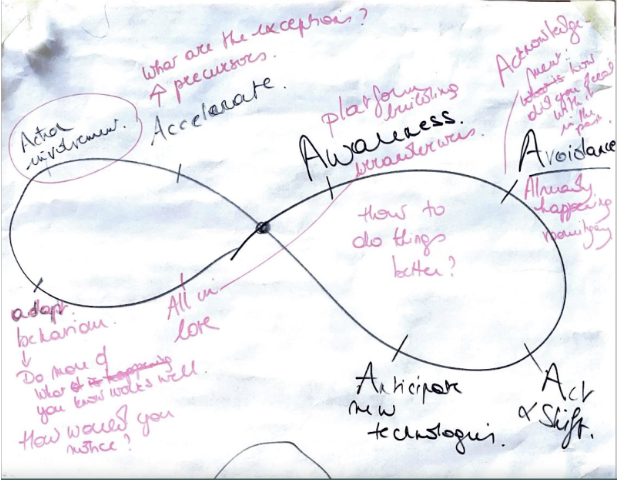Learning from frameworks for creating sustainability and change
An exploration
Sep 2, 2024

Synopsis
Cathy Macharis and John Brooker co-hosted an open space session at the Unconference titled “Frameworks for creating sustainability and change - what can we learn.” The session was a collaborative effort to explore how Solution-Focused (SF) practices could enhance sustainability frameworks within organisations. While they had originally planned separate sessions, Cathy and John combined their sessions, reviewing the two frameworks together to see what they and the attendees could learn.
Cathy introduced the Factor 8 change process, which she developed based on the ‘iceberg’ model. It is based on ‘8As’ Awareness, Avoidance, Act and Shift, Anticipation, Acceleration, Actor involvement, Alteration and All in love! She was curious to establish how to integrate SF techniques into this framework.
John brought the SF Sustainability Framework, co-developed with David Picton a former Head of Sustainability in a major British company. The SFS is designed to counteract the often problem-focused mindset prevalent in sustainability efforts, .
The SF Sustainability Model outlines a seven-step roadmap to enhance a business’s sustainability efforts, starting from reaffirming the business’s purpose to communicating achievements effectively.
Participants reviewed both frameworks during the session to understand their structures and underlying principles. The potential for incorporating SF methods into various stages of the Factor 8 process was explored, such as using SF questioning techniques to accelerate progress and enhance awareness.
Most of the conversation centred on how these frameworks could influence systemic behaviour and lead to meaningful changes in organisational sustainability practices.
The discussion revealed that while Factor 8 delves deep into underlying structures and dynamics (akin to the deeper parts of an iceberg), SF Sustainability focuses on actionable and visible change aspects.
The participants also explored how the two frameworks might be reconciled or integrated. There was an agreement that practitioners could adjust some steps of the Factor 8 framework to reflect a more solution-focused perspective, such as moving ‘Actors involvement’ to earlier stages to emphasise engagement and participation.
The discussions further highlighted the importance of ’noticing’ within the SF approach—acknowledging and building on what already works well.
In conclusion, participants considered both frameworks valuable for further exploration and adaptation. They agreed that integrating solution-focused language and techniques could transform the Factor 8 steps, such as changing ‘Avoidance’ to concepts like ‘Already Happening,’ to foster a more positive and proactive approach to sustainability challenges.
The session ended with a commitment to continue refining these models to better support sustainable change in organisational contexts, emphasising the synergy between deep structural understanding and surface-level actionable strategies.
Original workshop output
The Factor 8 Framework

Diagram showing the 8 ‘A’s of the Factor 8 Framework
The group explored and:
a. Agreed that while the Factor 8 framework uses the iceberg model - SF Sustainability is more on the surface.
b. Talked about the different world views that underpin the two frameworks.
c. Identified the potential to move steps in Factor 8 to reflect a more SF view, e.g. Make ‘Actors involvement’ earlier
d. Shared much about the concept of ‘noticing’ in Solution Focus
The group also talked about how practitioners might influence system behaviour, and considered SF and other ways of doing this.

Sketch showing the potential application of SF within the Factor 8 Framework
a. Awareness: Platform building
b. Avoidance: Already happening; acknowledgement: how did you deal with it in the past?
c. Act and shift: Small steps: How do things get done better? Anticipate new technologies
d. Actor involvement: Bring all actors together. What can they do, and how will they be affected?
e. Accelerate: What are the exceptions? And pre-cursors?
f. Acknowledgement rather than Avoidance: What is already happening. How did you deal with this in the past?
g. All in love: What is your new world view? How can we long, all together, for what we want to achieve together? Is there another wish that comes out of this?
h. Adapt behaviour: Do more of what you know works well. How would you notice?
The Solution Focus Sustainability Framework
SF Sustainability guides you to take Seven Steps in a roadmap towards clear, actionable targets – steps that build a more responsible and inspiring growth business.
Step One: Spell out (or re-affirm) the purpose of your business.
Step Two: Consult and run SFS workshops to learn what matters most to the people connected to your business
Step Three: Define (or re-define) how sustainability serves, supports and strengthens your business purpose, and decide your ambitions for sustainability
Step Four: Spell out your aim, decide how you will measure your achievements and prove those measures are credible
Step Five: Develop a Progress Canvas of your progress to date and the small steps to take to achieve success - if you’re at ‘5’ now on ‘carbon footprint’ (but want ‘8’), what will move you initially to ‘6’? Identify, assess and combine the actions necessary to achieve your sustainability objectives; this will also help to engage your people.
Step Six: Review the resources you need to progress, support those actions and paths, and assess what you need to learn.
Step Seven: The final step is to tell your story, using ‘communication planning’ to bring your achievements to life. This communication may be a stand-alone story, an annual report section or a fully integrated report explaining the essence of your business purpose. Your sustainability evidence will help win work, support growth, and enhance investor relations.